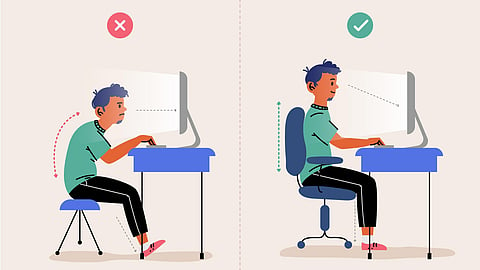Tips for Improving Posture
Good posture is not just about looking confident; it significantly contributes to better health, including enhanced digestive function. Here are some tips to improve your posture:
1. Mindful Sitting: Choose chairs that support the spine's natural curve. Ensure your feet are flat on the ground and your knees are at hip level.
2. Standing Tall: When standing, distribute weight evenly on both feet, keeping the shoulders back and head level, which helps maintain alignment.
3. Strengthening Exercises: Engage in exercises that strengthen your core muscles, which are crucial in maintaining good posture. Activities like yoga, pilates, and simple back-strengthening exercises can help.
4. Regular Breaks: If you're sitting for extended periods, take regular breaks to stand, stretch, and walk. This helps maintain circulation and gives your postural muscles a chance to reset.
Benefits of Good Posture on Digestion
A proper posture can foster efficient digestion. Maintaining good alignment gives the digestive organs the space and proper positioning needed to function optimally. This reduces the likelihood of problems such as acid reflux, indigestion, and constipation.
Good posture can also lead to improved breathing patterns. When you sit or stand upright, the diaphragm can move more freely, enhancing oxygen intake. This oxygen supports the cells in the digestive process, further enhancing efficiency.
Moreover, maintaining good posture helps ease the passage of food through the digestive tract, ensuring timely elimination of waste and reducing the chances of developing complications like diverticulosis or irritable bowel syndrome. As the process becomes more efficient, individuals often experience fewer digestive issues and generally feel better.
Conclusion
The significance of posture extends beyond aesthetics and contributes significantly to various aspects of health, notably digestion and bowel regularity. Understanding the impact of poor posture allows for proactive measures to be taken, ultimately fostering a more comfortable and healthier lifestyle. By prioritizing good posture, you enhance your digestive health and overall well-being, paving the way for a life characterized by comfort and balance.
Maintaining proper alignment reduces unnecessary pressure on the abdominal organs, allowing them to function more efficiently. Conversely, poor posture can compress the digestive tract, leading to issues such as acid reflux, bloating, and constipation. Incorporating regular movement, core-strengthening exercises, and mindful sitting habits can significantly improve posture and, in turn, digestive health. Additionally, being mindful of ergonomics in daily activities, such as working at a desk or lifting heavy objects, helps prevent postural imbalances that may contribute to digestive discomfort. A commitment to good posture fosters long-term health benefits, reinforcing the connection between spinal alignment and overall bodily function.


